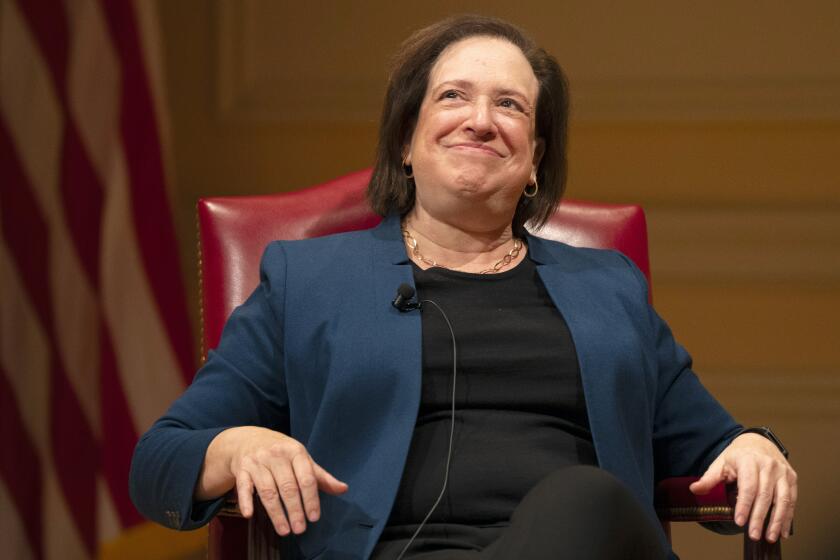Jackson Wins by 2 to 1 in Michigan : He Also Leads Dukakis in Delegates in State; Gephardt Is Distant Third
In a stunning victory that gave a major boost to his presidential candidacy, the Rev. Jesse Jackson overwhelmed Massachusetts Gov. Michael S. Dukakis Saturday in the Michigan Democratic presidential caucuses.
Running strongly in white and black areas, Jackson got nearly twice as many popular votes as Dukakis, and also appeared to be winning considerably more delegates than Dukakis, based on the popular vote in the 18 congressional districts.
With 85% of the vote in, Jackson had 101,037 votes or 54% of the total, to 53,041 votes or 28% for Dukakis.
Missouri Rep. Richard A. Gephardt, who had said he had to win in Michigan to remain a strong candidate, was running a distant third with 23,732 or 13%. Aides said he would meet today with family and advisers before announcing whether he will pull out of the race and run for reelection to Congress.
Simon and Gore Trail
Far behind were Sens. Paul Simon of Illinois and Albert Gore Jr. of Tennessee with about 2% of the vote each. Neither had campaigned hard in Michigan.
Preliminary calculations by the Associated Press gave Jackson 61 national convention delegates, Dukakis 43, Gephardt 22, and 12 undecided among the 138 at stake in Michigan.
These results tightened the overall delegate race a bit. By the AP count, Dukakis had 596.55, Jackson had 584.55, Gore had 362.8, Gephardt 178, Simon 171.5, and 371.6 were uncommitted. To win the nomination, a candidate needs 2,082 delegates.
Jackson, meanwhile, was already about 200,000 popular votes ahead of Dukakis nationally before his big triumph Saturday.
It was a big victory for Jackson--who finished third here in 1984--because this was the party’s first test in a major industrial state in which no favorite son was on the ballot.
And it dealt a blow to Dukakis’ recent argument that he was moving inevitably toward the Democratic nomination with his steady accumulation of delegates. Eleven days ago, he had finished third in Illinois behind favorite sons Simon and Jackson.
“This is the first major test where everyone was on the visiting team,” said Joel Ferguson, chairman of Jackson’s Michigan campaign. “No one was on his home turf.”
“You cannot minimize or denigrate Jackson’s victory in Michigan, and anyone who does is missing what is going on out there,” said Los Angeles attorney Mickey Kantor, a longtime adviser to many Democratic candidates.
“Jesse Jackson has proved that if you have a message and a natural constituency it makes a great deal of difference,” added Kantor, who has provided informal advice to the Gore campaign.
Dukakis had hoped in Michigan to have the edge in delegates--and declare that a victory--because 90 of the 138 delegates are apportioned by congressional district, and the governor expected Jackson’s strength to be largely confined to two predominantly black districts in Detroit.
Won 10 of 18 Districts
Instead, Jackson won the popular vote in 10 of the 18 districts, many of them with a low percentage of blacks.
For all of Jackson’s surprising statewide strength, it was the black vote--particularly in Detroit--that gave him his landslide. More than 42% of Jackson’s total vote came in the two majority black districts. And blacks apparently turned out strongly in other districts.
Jackson defied conventional wisdom on two counts here: He ran well all over the state and he won despite what party officials considered a high turnout--about 200,000 caucus-goers.
The reasoning before today was that a high turnout would benefit Dukakis because much of it would be whites newly attracted to the process. But clearly Jackson won many of those whites.
Wins University Towns
Jackson won the majority-white congressional districts containing the cities of Saginaw, Flint, Pontiac, Lansing, Kalamazoo and Muskegon. He also won in the university towns of Ann Arbor (University of Michigan) and East Lansing (Michigan State).
In the congressional district that includes the city of Flint and its heavily unionized auto plants, Jackson beat Dukakis by more than 2 to 1, an indication that many workers were remembering that Jackson had stood with strikers and the unemployed in a number of areas around the country.
But Jackson also did respectably in middle and upper Michigan, areas with few blacks and union members.
“We felt if we took Jesse around the state and people heard what he had to say, we would win,” said Ferguson.
Picking Front-Runner
Then, in a reference to a statement by Democratic National Chairman Paul G. Kirk Jr. that the party should soon unite behind a front-runner, Ferguson added:
“If we are going to get behind a consensus front-runner, that means we ought to get behind Jesse Jackson.”
As the outcome became clear Saturday evening, Dukakis acknowledged that it was Jackson’s night.
“It looks as if Rev. Jackson has won the popular vote in Michigan,” the Massachusetts governor said late Saturday in Milwaukee, where he was already campaigning for Wisconsin’s April 5 primary. “I congratulate Jesse on this. He’s run a good campaign, an exciting campaign.”
‘Nothing Inevitable’
When asked about his own prospects for winning the nomination, Dukakis said: “There’s nothing inevitable about anything in American politics.
“It’s a marathon,” he said. “We’re really only at the midpoint. I don’t think I did very well in Michigan today. I did reasonably well, but I don’t think I did spectacularly well.”
Dukakis’ national political coordinator, Alice Travis, took a more strategic approach to the Michigan result, attempting to portray the race now as one between a Democrat who could be elected in November, Dukakis, and one who she and others do not think could be elected, Jackson.
‘A Two-Man Race’
“It’s a two-man race,” Travis said in Lansing as the returns came in. “Only two candidates are running national campaigns. We’ve always said first or second place would be good in Michigan and we’ve gotten a lot of delegates around the state.”
But the best face Dukakis could put on the Michigan result was that it apparently eliminated Gephardt as a serious candidate, leaving only Gore as a serious white alternative to Dukakis.
Gephardt, who had tried to restart his presidential campaign in Michigan, planned to meet with family and advisers today before announcing whether he will pull out of the race and run for reelection to Congress, aides said.
“He’s going to go home (to Washington), meet with his family Sunday and look at the numbers,” campaign press secretary Ali Webb said. “He’ll have something to say Monday.”
Bitter Medicine
Speaking in Milwaukee Saturday night, Gephardt appeared resigned to the inevitable, and spoke of his campaign in the past tense.
“My campaign has had its successes and its setbacks,” he said. “But at heart, our greatest victory has been to call the Democratic Party back to its essential role as an agent of fundamental change.”
Tuesday is the deadline for Gephardt to file as a candidate for reelection to Congress from Missouri. Although aides said he could file for reelection and remain a candidate for President, his showing in Michigan increased the chances he will drop out of the presidential contest.
Staff writers Robert A. Rosenblatt in Lansing and Robert Shogan in Milwaukee contributed to this story.
More to Read
Get the L.A. Times Politics newsletter
Deeply reported insights into legislation, politics and policy from Sacramento, Washington and beyond. In your inbox three times per week.
You may occasionally receive promotional content from the Los Angeles Times.






